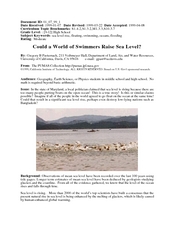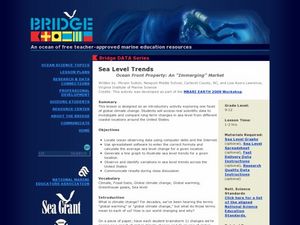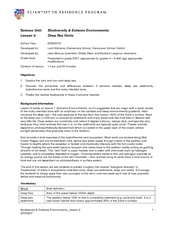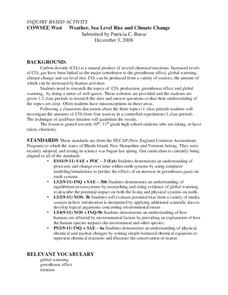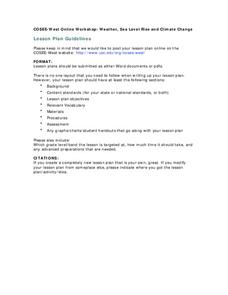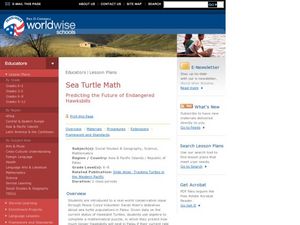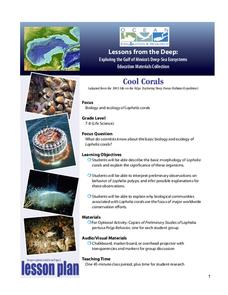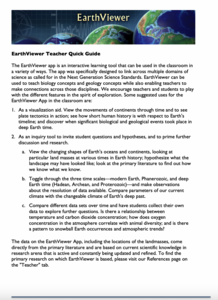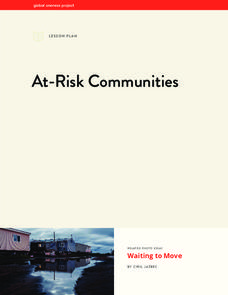Curated OER
Could a World of Swimmers Raise Sea Level?
Students determine the volume of water they displace. In this earth science lesson, students calculate the total water displaced by the world's population. They evaluate whether or not this value is enough to raise the sea level...
Constitutional Rights Foundation
The Dispute Over the South China Sea
Just who owns the South China Sea—and its vast resources—has been a conundrum for decades. Pupils explore the international law and disputes surrounding the resource-rich body of water, as well as China's claims over it. A background...
Curated OER
Professor of Ice
In this environment experiment learning exercise, students complete 3 experiments using ice. First they label each experiment and respond to the four questions given. Then students do the 3 experiments as stated, considering what the...
American Museum of Natural History
Journey to Deep Sea Vents
Take a deep dive into oceanography. The online interactive allows for learners to board a submersible to dive to the bottom of the ocean to investigate sea vents. On the way down, individuals see different marine life at different...
Global Oneness Project
A Vanishing Island
The effects of rising sea levels on Isle de Jean Charles, located off the coast of Louisiana, are documented in Emmanuel Vaughan-Lee's poignant short video. Viewers are asked to consider not only the plight of residents but also what...
Curated OER
Sea Level Trends ~ Ocean Front Property: An "Immerging" Market
Young oceanographers take a look at sea level data from several cities over a few centuries. They use the data to fuel a discussion about what kind of changes are taking place and the impact they are having on the coastal ecosystems....
Curated OER
Deep Sea Vents
Learners study the vent and non vent deep sea and see the differences in habitats. In this investigative lesson students complete a worksheet and work in groups.
Curated OER
Sea Turtles and Nesting Behavior
Students explore the nesting behavior used by sea turtles and explain how these behaviors are beneficial in the survival of a species. They discuss the advantages and disadvantages that sea turtles have be mass nesting. They identify...
Curated OER
Weather, Sea Level Rise and Climate Change
Students compare the carbon dioxide content of four different samples. In this chemistry lesson plan, students research the causes of global warming. They explain how humans contribute to rising global temperature.
Curated OER
Weather, Sea Level Rise and Climate Change
Eighth graders compare and contrast weather and climate. In this earth science lesson, 8th graders research weather data site and analyze historical data. They present their findings in class and explain identifiable trends.
Curated OER
Chilean Sea Bass
Introduce your mini-marine biologists to using databases. Tables of how many Chilean Sea Bass were caught and number of hours spent fishing are examined. Using the data, individuals calculate the "Catch per Unit of Effort" for each year....
Curated OER
What Are The Properties of Sea Water?
Ninth graders conduct research on the subject of sea water. They use a variety of resources to obtain information. There are helpful resource links listed in the lesson plan. In conjunction with the research students make inquiry of the...
College Board
2010 AP® Environmental Science Free-Response Questions
Scientists rely heavily on data to make predictions and find solutions. Young scholars become scientists as they analyze information presented to them to construct responses. They consider scenarios related to air pollution, invasive...
NASA
The Big Climate Change Experiment Lesson 3: Climate Change Lines of Evidence
Consider the preponderance of evidence when making a verdict. The third of five lessons in Unit 1: The Big Climate Change Experiment focuses on the evidence for climate change. Learners study graphs, diagrams, and pictures regarding...
Curated OER
Mapping Ancient Coastlines
Most of this lesson is spent working on the "Bathymetry Worksheet." It includes a graph of the changes in sea level over the past 150,000 years and a bathymetric map of changes in an imaginary coastline over time. Participants answer...
Manchester University
Where The Forest Meets The Sea
Join a father and his son as they explore an isolated location off the coast of Australia in the children's book Where the Forest Meets the Sea by Jeannie Baker. Engage young learners in reading this fun story with this series of...
NOAA
Deep-Sea Ecosystems – Entering the Twilight Zone
Imagine an ecosystem without any light or oxygen, where living things convert carbon dioxide into food. This ecosystem is thriving and might just be the largest ecosystem on our planet, yet we know very little about it. The instructional...
Curated OER
Rate of Coral Growth
Using a table of information provided, middle school marine biologists chart data on a graph to determine the impact of water depth on coral growth in Australia's Great Barrier Reef. Then they answer questions that connect the data to...
Curated OER
Sea Turtle Math
Students consider the future of endangered species. In this conservation lesson, students view a slide show and use mathematical data to construct a prediction for the survival of an endangered species. This lesson includes, personal...
NOAA
Deep-Sea Ecosystems – Cool Corals
Young oceanographers research deep sea corals that thrive on chemosynthesis. The lesson focuses on the biology of the animal, preferred habitat, associations, and interactions.
Curated OER
Sea Water Freeze
Middle schoolers observe how salinity affects the time it takes water to freeze. They participate in an experiment to determine that ice is essentially salt-free whether formed from fresh or salt water
Howard Hughes Medical Institute
Classroom Activities: EarthViewer
The spot you are standing in right now—how did it look 2,000 years ago, one million years ago, or even four billion years ago? Scholars use a model of Earth throughout history to learn about continental drift, climate change, changes in...
Curated OER
Build Your Own Sea Turtle
Students design and create their own sea turtles. They investigate the marine turtle anatomy by constructing a model of a sea turtle. They incorporate the vocabulary that identifies each part of the sea turtle's anatomy.
Global Oneness Project
At-Risk Communities
"Waiting to Move," a photo essay by Ciril Jazbec, brings into sharp focus the threats posed by climate change. Class members examine images of Shishmaref Island and the Native Alaskan Inupiate coastal villages that are impacted by rising...
Other popular searches
- Below Sea Level
- Above Below Sea Level
- Sea Level Changes
- Sea Level Rise
- Sea Level Rising
- Sea Level Rise Calculation
- Sea Level Journal
- Modelling Sea Level Changes
- Modeling Sea Level Changes
- Rising Sea Levels
- Model Ling Sea Level Changes


